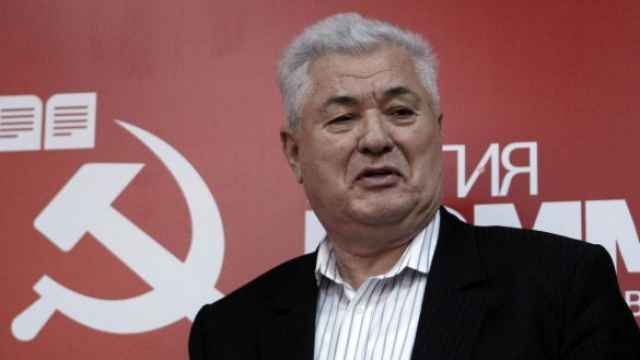ASTANA, Kazakhstan — Heads of state flying to Kazakhstan's showpiece capital for a security summit this week will be met with fanfare as Astana shrugs off critics of its year at the helm of Europe's top security and rights watchdog.
U.S. Secretary of State Hillary Clinton is expected at the Organization for Security and Cooperation in Europe's first summit since 1999, the crowning achievement of Kazakhstan's year as the first former Soviet republic to chair the 56-nation body.
The OSCE says it aims to address urgent problems such as terrorism and trafficking of drugs, weapons and people, as well as protracted conflicts in the Eurasian region and Afghanistan.
The Astana summit on Wednesday and Thursday is also a source of pride for Kazakh President Nursultan Nazarbayev, who has run his oil-rich country for more than 20 years and is keen to display his brainchild — the fast-rising capital on the windswept steppe.
"First and foremost, the OSCE summit is a foreign policy advertisement project and President Nazarbayev's personal public relations project," said political analyst Dosym Satpayev.
"He is very ambitious and is keen to position himself not as a regional but, rather, a world leader," he said. "The presentation of the new capital — the president's pet and pricey toy — also means great promotion for him personally."
The OSCE has not held a heads of state summit since its Istanbul meeting 11 years ago. A spokeswoman for the Vienna-based body said members would discuss the reaffirmation of the OSCE's key commitments to regional security.
President Dmitry Medvedev will attend, the Kremlin said. German Chancellor Angela Merkel and European Council President Herman Van Rompuy are also expected in Astana.
The leaders of Azerbaijan and Armenia are expected to attend and may discuss a long-awaited peace deal for the breakaway region of Nagorno-Karabakh.
Amid unprecedented security measures, Kazakh television and print media have posted splashy advertisements of the summit, calling it "a great achievement of all people of Kazakhstan."
But, souring the official pomp, human rights bodies say Kazakhstan has reneged on democracy and rights commitments that it promised to implement during its year as chair of a group dedicated to democratic progress as well as security.
"We are deeply convinced that Kazakhstan has not made good on all those obligations which it undertook when acquiring the right to chair the OSCE," said Vyacheslav Abramov, deputy head of the U.S.-based rights watchdog Freedom House.
"No progress has been made in any of the spheres in which Kazakhstan pledged to conduct democratic reforms," he said.
Criticism of Nazarbayev remains taboo at home. The parliament this year adopted a law that bestows upon him "Leader of the Nation" status and toughens punishment for insulting his dignity in public or for desecrating his pictures.
The veteran leader neither signed the law nor vetoed it.
Last year, Nazarbayev endorsed a bill allowing officials to block Internet sites containing information deemed illegal. At least one journalist and one human rights activist are in jail, while authorities have closed or fined some critical newspapers.
Officials respond that Nazarbayev's rule is softer than that in other Central Asian states. They say the country has preserved political stability and multinational harmony in a region where Islamist militancy and ethnic violence is rife.
Higher living standards are also cited by the leaders of Central Asia's largest economy and oil producer. Nazarbayev has overseen more than $150 billion in foreign investment and implemented textbook reforms of banks and the pension system.
Kazakh Foreign Ministry spokesman Roman Vasilenko said the West had not called Astana's democratic credentials into question. Only the speed of democratic change has been debated.
"The two principles of Kazakhstan's approach are: 'Economics first, politics second' and 'Evolution, not revolution,'" he said. "As we have seen, these sane and justified principles have ensured our country's stability and economic growth.
"We in Kazakhstan believe that you can't build a democracy on an empty stomach."
A Message from The Moscow Times:
Dear readers,
We are facing unprecedented challenges. Russia's Prosecutor General's Office has designated The Moscow Times as an "undesirable" organization, criminalizing our work and putting our staff at risk of prosecution. This follows our earlier unjust labeling as a "foreign agent."
These actions are direct attempts to silence independent journalism in Russia. The authorities claim our work "discredits the decisions of the Russian leadership." We see things differently: we strive to provide accurate, unbiased reporting on Russia.
We, the journalists of The Moscow Times, refuse to be silenced. But to continue our work, we need your help.
Your support, no matter how small, makes a world of difference. If you can, please support us monthly starting from just $2. It's quick to set up, and every contribution makes a significant impact.
By supporting The Moscow Times, you're defending open, independent journalism in the face of repression. Thank you for standing with us.
Remind me later.





